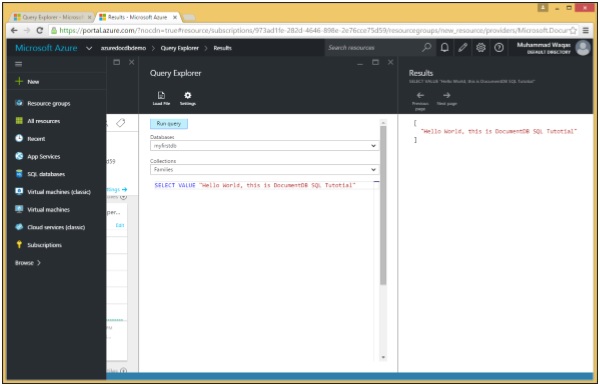
- DocumentDB SQL Tutorial
- DocumentDB SQL - Home
- DocumentDB SQL - Overview
- DocumentDB SQL - Select Clause
- DocumentDB SQL - From Clause
- DocumentDB SQL - Where Clause
- DocumentDB SQL - Operators
- DocumentDB - Between Keyword
- DocumentDB SQL - In Keyword
- DocumentDB SQL - Value Keyword
- DocumentDB SQL - Order By Clause
- DocumentDB SQL - Iteration
- DocumentDB SQL - Joins
- DocumentDB SQL - Aliasing
- DocumentDB SQL - Array Creation
- DocumentDB - Scalar Expressions
- DocumentDB SQL - Parameterized
- DocumentDB SQL - Built-in Function
- Linq to SQL Translation
- JavaScript Integration
- User-Defined Functions
- Composite SQL Queries
- DocumentDB SQL Useful Resources
- DocumentDB SQL - Quick Guide
- DocumentDB SQL - Useful Resources
- DocumentDB SQL - Discussion
DocumentDB SQL - Value Keyword
When you know you're only returning a single value, then the VALUE keyword can help produce a leaner result set by avoiding the overhead of creating a full-blown object. The VALUE keyword provides a way to return JSON value.
Let’s take a look at a simple example.

Following is the query with VALUE keyword.
SELECT VALUE "Hello World, this is DocumentDB SQL Tutorial"
When this query is executed, it returns the scalar "Hello World, this is DocumentDB SQL Tutorial".
[ "Hello World, this is DocumentDB SQL Tutorial" ]
In another example, let’s consider the three documents from the previous examples.
Following is the AndersenFamily document.
{
"id": "AndersenFamily",
"lastName": "Andersen",
"parents": [
{ "firstName": "Thomas", "relationship": "father" },
{ "firstName": "Mary Kay", "relationship": "mother" }
],
"children": [
{
"firstName": "Henriette Thaulow",
"gender": "female",
"grade": 5,
"pets": [ { "givenName": "Fluffy", "type": "Rabbit" } ]
}
],
"location": { "state": "WA", "county": "King", "city": "Seattle" },
"isRegistered": true
}
Following is the SmithFamily document.
{
"id": "SmithFamily",
"parents": [
{ "familyName": "Smith", "givenName": "James" },
{ "familyName": "Curtis", "givenName": "Helen" }
],
"children": [
{
"givenName": "Michelle",
"gender": "female",
"grade": 1
},
{
"givenName": "John",
"gender": "male",
"grade": 7,
"pets": [
{ "givenName": "Tweetie", "type": "Bird" }
]
}
],
"location": {
"state": "NY",
"county": "Queens",
"city": "Forest Hills"
},
"isRegistered": true
}
Following is the WakefieldFamily document.
{
"id": "WakefieldFamily",
"parents": [
{ "familyName": "Wakefield", "givenName": "Robin" },
{ "familyName": "Miller", "givenName": "Ben" }
],
"children": [
{
"familyName": "Merriam",
"givenName": "Jesse",
"gender": "female",
"grade": 6,
"pets": [
{ "givenName": "Charlie Brown", "type": "Dog" },
{ "givenName": "Tiger", "type": "Cat" },
{ "givenName": "Princess", "type": "Cat" }
]
},
{
"familyName": "Miller",
"givenName": "Lisa",
"gender": "female",
"grade": 3,
"pets": [
{ "givenName": "Jake", "type": "Snake" }
]
}
],
"location": { "state": "NY", "county": "Manhattan", "city": "NY" },
"isRegistered": false
}
Following is the query.
SELECT VALUE f.location FROM Families f
When this query is executed, it return the returns the address without the location label.
[
{
"state": "NY",
"county": "Manhattan",
"city": "NY"
},
{
"state": "NY",
"county": "Queens",
"city": "Forest Hills"
},
{
"state": "WA",
"county": "King",
"city": "Seattle"
}
]
If we now specify the same query without VALUE Keyword, then it will return the address with location label. Following is the query.
SELECT f.location FROM Families f
When this query is executed, it produces the following output.
[
{
"location": {
"state": "NY",
"county": "Manhattan",
"city": "NY"
}
},
{
"location": {
"state": "NY",
"county": "Queens",
"city": "Forest Hills"
}
},
{
"location": {
"state": "WA",
"county": "King",
"city": "Seattle"
}
}
]